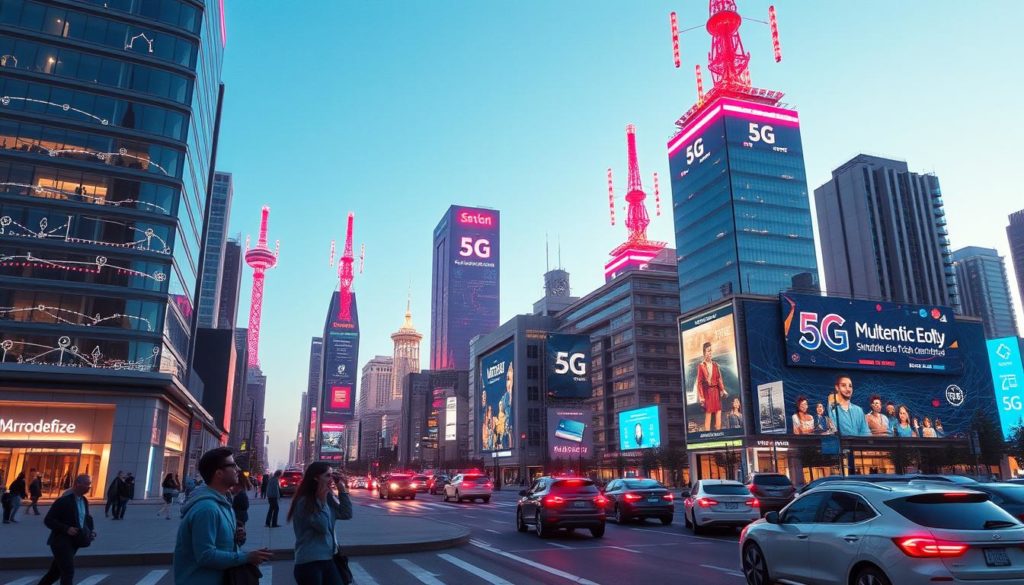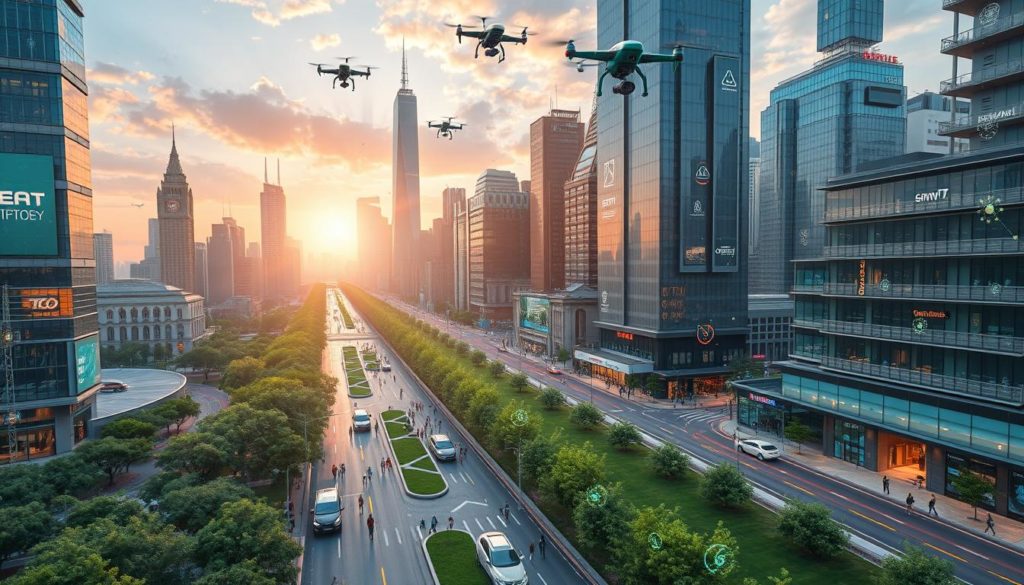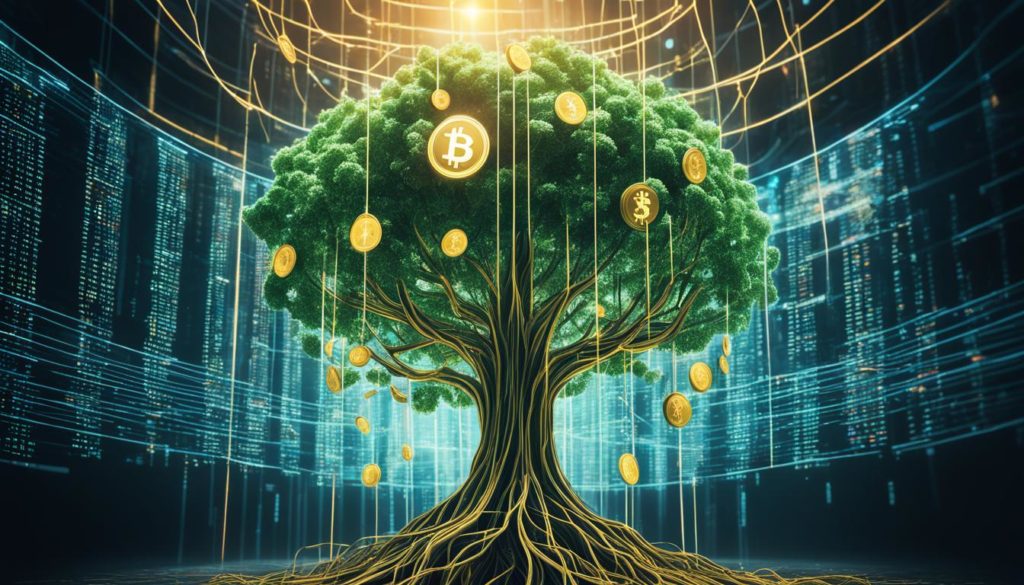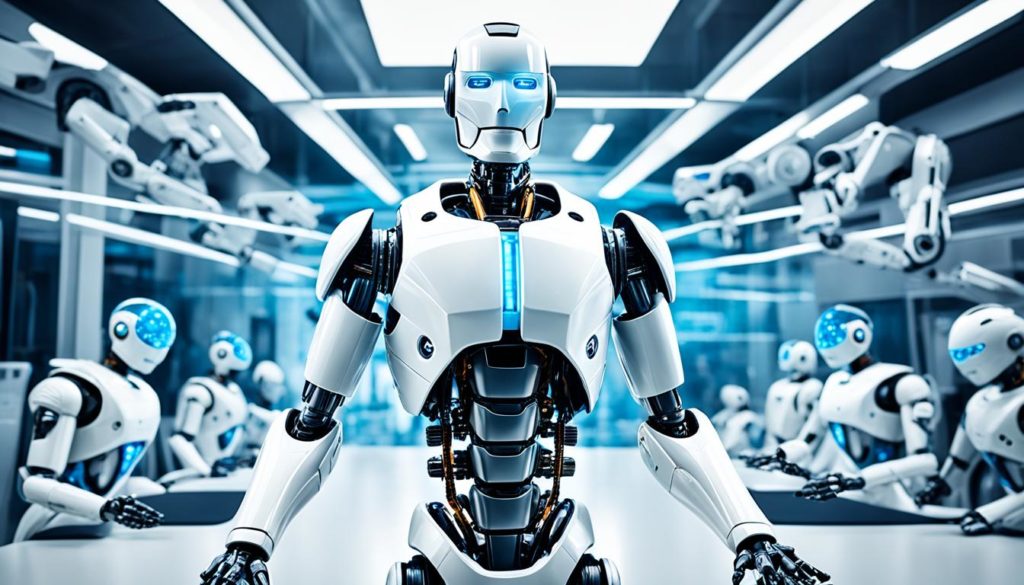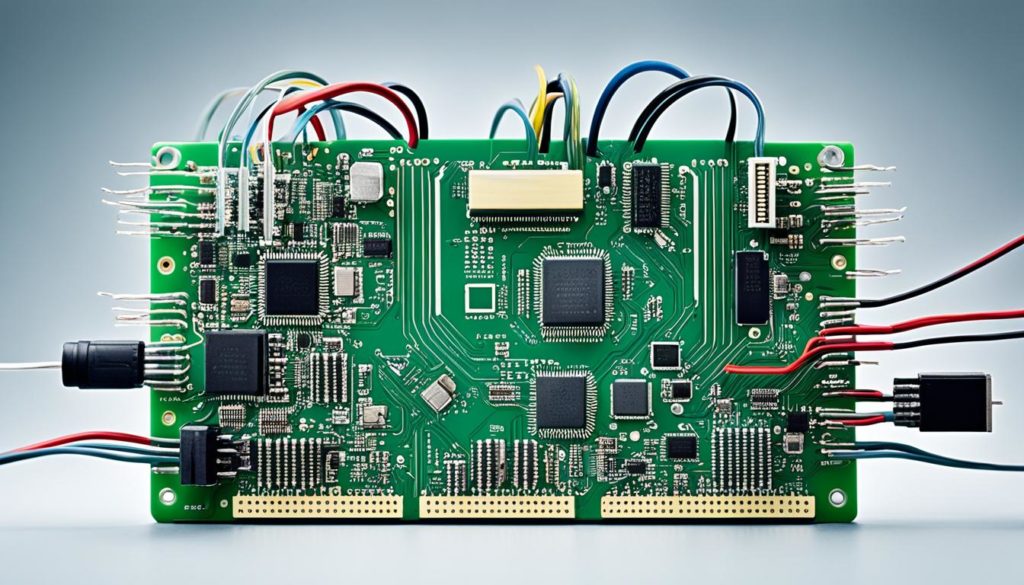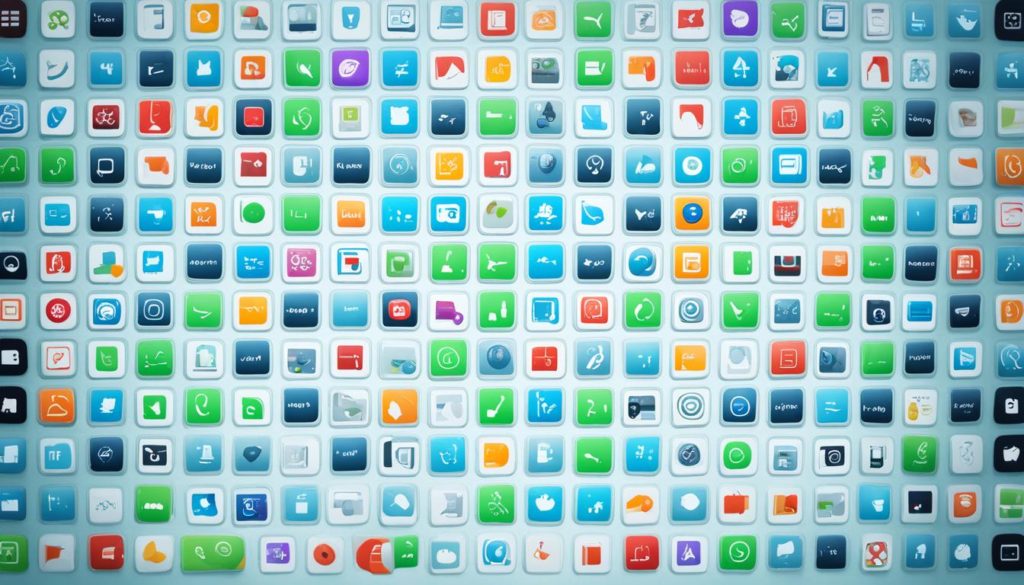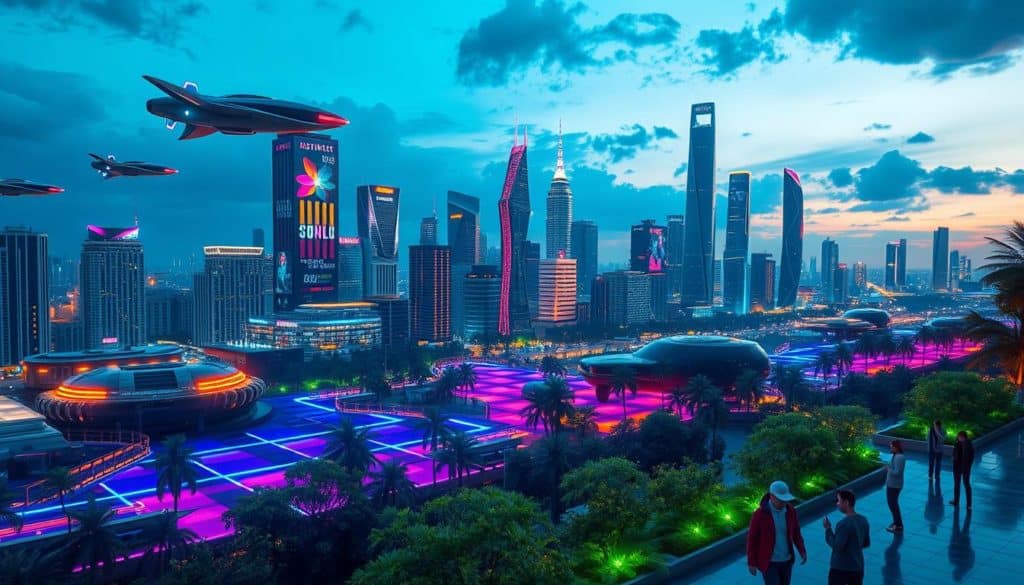
Did you know that global IT spending is forecast to increase by 8% from 2023 to 2024, reaching approximately $5 trillion? As we approach 2024, new technologies are emerging. They offer many opportunities for IT professionals and businesses. To stay ahead, professionals need to learn and adapt quickly to future tech trends.
These trends, like generative AI, will unlock new creative potential and efficiency. They will change many sectors and lead to a more digital world.
In this article, we explore the most exciting technological advancements. We’ll look at quantum computing, 5G networks, and biotechnology. Join us on a journey through the future of innovation.
Key Takeaways
- Quantum computers solve complex problems exponentially faster, impacting areas like cryptography and drug discovery.
- 5G networks provide faster speeds and stable connections, revolutionizing IoT and AR applications.
- AI is increasingly capable of generating creative content, boosting productivity across various industries.
- Biotechnology advancements enhance crop resistance and productivity, crucial for climate change adaptation.
- Blockchain technology extends beyond cryptocurrencies, offering transparency and security in multiple sectors.
Introduction to Emerging Technologies
The world of emerging technologies is changing fast. It’s transforming many industries. Leaders and workers know how big of a role digital change will play in the digital landscape.
With IT spending set to reach $5 trillion by 2024, companies need to adapt. They must integrate digital strategies well.
AI, quantum computing, and personalized medicine are key areas. They show how new tech is changing our world. AI, for example, is being used more in businesses, opening up new opportunities.
Also, the use of spatial computing and the industrial metaverse is growing. They use data and AI to mimic real-life scenarios. This opens up new ways to improve industries.
But it’s not just about tech. It’s also about people. There’s a push to make tech jobs more appealing. Companies are also working to prevent fake media, keeping trust in the digital landscape.
Building a strong tech base is key for AI to grow. Leaders and companies are working hard to innovate. Deloitte’s NExT team helps businesses understand these new tech trends.
Deloitte identified the Essential Eight in 2016. These technologies have evolved a lot. They help businesses decide where to invest in emerging technologies.
In short, focusing on tech wellness and reducing debt is vital for future leaders. Trust is key among leaders, stakeholders, and workers. By embracing these trends, companies can succeed in a world of constant change.
AI-Generated Content: Revolutionizing Creativity
AI-generated content is changing the game in creativity revolution. It uses AI advancements to transform artistic and media work. This shift is making creative processes better in text, visual arts, and music.
Understanding AI-Generated Content
Generative AI is getting more popular, showing the next big step in AI advancements. Tools like GPT and DALL-E create content that looks like it was made by humans. For example, “Portrait of Edmond de Belamy” sold for $432,500 at auction, showing AI’s value in art.
In music, AI helps create new songs based on patterns of old ones. This lets musicians try out new things. Visual art and sculpture are also getting a boost from AI, making designs that are hard to do by hand.
Applications and Benefits
AI-generated content has many uses and benefits. It’s changing marketing by making content more personal, which can lead to better results. In fact, 44.4% of businesses use AI for marketing. The market for AI in content creation is expected to grow to $1.8 billion by 2026.
AI is also making virtual reality art possible. This lets artists create immersive experiences in virtual worlds. These advancements are making creativity more accessible and professional.
But, there are challenges too. Issues like plagiarism, copyright problems, and biases in AI data need to be addressed. Humans still play a key role in making sure AI content fits their vision and connects with their audience.
Here’s a table showing the good and bad sides of AI in content creation:
| Aspect | Advantages | Challenges |
|---|---|---|
| Efficiency | Time-saving, Cost-effective | Limited Creativity |
| Content Quality | Enhanced SEO Performance | Ethical Concerns |
| Productivity | Increased Efficiency | Inability to Replace Human Writers |
Working together, humans and AI advancements are opening up new possibilities in content creation. As we keep using these technologies, the world of creative arts is set for big changes.
Quantum Computing: The Next Frontier
Quantum computing is a huge leap in technology. It uses quantum mechanics to do things that classical computers can’t. This field is growing fast, with new developments and uses popping up everywhere.
Small startups are growing fast in quantum computing. In just one year, companies with fewer than six employees jumped to 11 percent. Meanwhile, companies with more than 100 employees grew to 39 percent, showing the industry is getting bigger and more mature.
Quantum computing’s power is growing fast. Over 65 percent of experts think we’ll have fault-tolerant quantum computers by 2030. This technology will change how we solve complex problems and will impact many industries.
Quantum computing is also changing how we do drug discovery. It can model molecular interactions at an atomic level, making things faster and more accurate. This is just the beginning of what it can do.
But quantum computing also poses a threat to old encryption methods. Quantum computers can break these codes in seconds, while classical computers take millions of years. The industry is working on new, safer ways to protect data.
About 55 percent of quantum industry leaders are already using their tech in real-world applications. This is up from 33 percent last year. Companies like IBM, Google, and Microsoft are leading the way, making quantum computing ready for the future.
But there are still challenges ahead. Like keeping qubits stable and solving errors. Researchers are working hard to make quantum computing better. They’re making progress in AI, machine learning, and even climate modeling.
| Quantum Computing Metric | 2019 | 2023 |
|---|---|---|
| Use Cases in Production | 33% | 55% |
| Companies with | 0% | 11% |
| Companies with >100 Employees | 9% | 39% |
| Fault-tolerant Quantum Computing by 2030 | N/A | 65% |
Quantum computing can process data much faster than classical computers. This is a big change in how we solve problems. It will change many fields, from medicine to finance, and make things more efficient and innovative.
5G Technology and Its Impact
The arrival of 5G technology is changing how we connect. It supports new tech like IoT, AR, and self-driving cars. This change brings faster data, wider coverage, and better connections.
5G is key for sectors like healthcare, transport, and entertainment. It’s all about fast, reliable communication and handling big data in real-time.
What is 5G?
5G is the latest mobile network tech. It’s known for its super-fast speeds and quick connections. Compared to 4G, 5G is up to 100 times faster.
This new tech can handle lots of devices and data. It’s essential for changing how we work and play in many fields.
Applications in Various Sectors
5G’s impact is huge, affecting many areas:
- Healthcare: It makes remote surgeries and patient monitoring possible. It also boosts telemedicine.
- Entertainment: 5G means better streaming and virtual reality experiences.
- Smart Cities: It’s crucial for managing traffic, safety, energy, and IoT projects.
- Manufacturing: It helps with automation and robotics, making production more efficient.
- Telecommunications: It’s changing how we communicate by improving network performance.
China leads the 5G market with a 67% share. It’s expected to grow to US$ 677.8 billion. Big names like Saudi Telecom and AT&T are leading the global 5G rollout.
Future Tech Trends: What’s Next?
As we move forward, the tech world is getting more exciting. AI integration and IoT are leading the way. Companies need to keep up to use these new tools well.
Generative AI is getting a lot of attention. Searches for it went up by almost 700% from 2022 to 2023. Even though tech investments dropped, people still want to explore new tech.
Large language models are now handling much bigger prompts. This shows AI is getting more complex and powerful. It’s setting the stage for AI to be used in many areas.
Job postings for tech jobs went down by 26% in 2023. But, there’s still a big push to learn new tech skills. People are eager to get better at what they do.
In 2023, there was a big increase in jobs for generative AI and green tech. Also, 25% of people are using generative AI more. It’s becoming a key technology.
IoT is making our world more connected. This is changing how we live and work. Soon, our digital and physical lives will blend together smoothly.
| Trend | Impact |
|---|---|
| Generative AI Searches | Increased by 700% from 2022 to 2023 |
| Tech Equity Investments | Dropped by 30-40% in 2023 |
| Prompt Size for LLMs | Expanded from 100k to 2 million tokens |
| Tech-Related Job Postings | Declined by 26% in 2023 |
| Gen AI Adoption | 25% scaling use by 2023 |
| IoT and Big Data | Sustained Growth in Smart Devices |
To keep up with tech trends, we need to form partnerships and manage risks. Being ready for new tech is key. This way, we can enjoy a future full of new discoveries and improvements.
Transformative Potential of IoT
The Internet of Things (IoT) is changing our lives and industries. It’s especially important in smart cities, where it helps solve urban problems. IoT uses data to make cities better.
IoT in Smart Cities
IoT makes smart cities work better. It connects devices and sensors. These sensors manage traffic, energy, and safety.
For example, IoT helps traffic flow better. It also saves energy and money. This makes cities more livable.
Studies show IoT can greatly improve cities. McKinsey says it could cut deaths by 80% and crime by 30%. OneData Software Solutions Pvt Ltd also notes IoT’s role in making cities more efficient.
Advances in IoT Applications
IoT is changing many fields, like healthcare and farming. It’s getting smarter with AI and ML. This makes IoT systems more efficient.
In healthcare, IoT helps monitor patients remotely. It also makes medical devices smarter. This improves care and efficiency.
Edge computing and 5G are also changing IoT. They make it faster and more reliable. This makes cities smarter and better for living.
| Key Trends | Impact |
|---|---|
| Integration of AI and ML | Enhanced decision-making in automated systems |
| Edge Computing and 5G | Minimized latency, improved real-time analytics |
| Digital Twins | Real-time simulation, increased operational efficiency |
| Advanced Security Protocols | Increased IoT device and network safety |
| Sustainability Initiatives | Eco-friendly, energy-efficient IoT solutions |
| Precision Agriculture | Optimized resource utilization, efficient practices |
Biotechnology: Redefining Healthcare
Biotechnology is changing healthcare by using genetic engineering and new biotech discoveries. The Human Genome Project, finished in 2003, helped start many new advancements. It lets us work with genetic information in new ways. This is thanks to tools like Illumina’s MiSeq System and the NovaSeq X Plus, which can sequence thousands of genomes every year.
Now, treatments are made just for each person’s genes. This is thanks to personalized medicine. CRISPR technology is also being explored for treating genetic diseases. For example, Vertex and CRISPR Therapeutics’ exagamglogene autotemcel (exa-cel) might soon be approved in Europe for sickle cell disease.
The quick development of mRNA vaccines by Pfizer and BioNTech shows how fast biotechnology can change healthcare. These vaccines are a great example of how biotech can fight new diseases quickly.
- Annual Breakthroughs in Healthcare Advancements:
- Brain images reconstructed using fMRI (March 2023)
- DNA manipulated through electric signals (July 2023)
- Neural firing translated into speech (Aug 2023)
Healthcare is expected to see big changes soon. Gene therapy for sickle cell anemia was approved in December 2023. There are also ongoing trials for cancer vaccines. But, there are also challenges like the cost of CRISPR technology and worries about living longer.
Biotechnology is not just changing healthcare. It’s also changing agriculture and how we manage the environment. Gene editing tools like CRISPR could make crops more resilient. This could change how we grow food. But, there are also worries about how to use these new tools responsibly.
It’s important to talk about biotechnology clearly and honestly. Misinformation can slow down progress. We need to educate people about what biotechnology can and cannot do.
| Advancements | Impact |
|---|---|
| Gene therapy for sickle cell anemia | Economic growth, healthcare transformation |
| mRNA vaccine adaptability | Rapid response to global health threats |
| CRISPR-based treatments | Functional cures for genetic disorders |
| Next-generation sequencing (NGS) | Enhanced genetic analysis capabilities |
Conclusion
As we wrap up our look at future tech, it’s clear that AI, biotechnology, and quantum computing will change our world. AI and machine learning are set to transform industries, making them more efficient and solving big problems. They will change healthcare and manufacturing, making a big impact.
Technologies like 5G, IoT, and blockchain will also shape our future. 5G will make connections faster and more reliable, helping us build smart cities and self-driving cars. IoT will create a lot of data, changing how we live and work.
But we must think about the ethics and impact of these new technologies. The AI market is growing fast, and cybersecurity threats are rising. We need to balance tech progress with ethics and security. As we move forward, using these technologies wisely will shape our future and ensure it’s sustainable.
FAQ
What are some of the key future tech trends we should be watching?
Future tech trends include AI, quantum computing, 5G, IoT, biotechnology, and extended reality. These will change healthcare, transportation, and entertainment.
How is AI generated content transforming creativity?
AI-generated content uses tools like GPT and DALL-E. It creates articles, educational materials, music, and visuals. This boosts content creation and personalizes marketing and education.
What is the significance of quantum computing?
Quantum computing uses quantum mechanics to solve problems faster than classical computers. It helps in cryptography and drug discovery. It could solve big challenges and change industry standards.
How will 5G technology impact our digital landscape?
5G will make connectivity faster, wider, and more stable. It supports IoT, AR, and self-driving cars. It will change healthcare, manufacturing, transportation, and entertainment.
What are some advancements and trends in IoT?
IoT is making smart cities by connecting devices and sensors. It manages traffic, energy, safety, and emergencies. It uses real-time data and connectivity.
How is biotechnology transforming healthcare?
Biotechnology, like CRISPR and personalized medicine, is changing healthcare. It treats genetic disorders, improves crops, and supports regenerative medicine. It promises new health care possibilities.
How does generative AI benefit content creation?
Generative AI makes creative tools more accessible and speeds up content creation. It personalizes marketing, education, and art. It drives innovation in many fields.
Why is digital transformation critical for businesses?
Digital transformation keeps businesses competitive. It involves using digital technologies in all areas. It optimizes operations, improves customer experiences, and drives innovation.
What is the future outlook for emerging technologies?
Emerging technologies like AI, quantum computing, IoT, and biotechnology will keep advancing. They will shape a future focused on sustainability, innovation, and ethics.
Future App Studios is an award-winning software development & outsourcing company. Our team of experts is ready to craft the solution your company needs.


